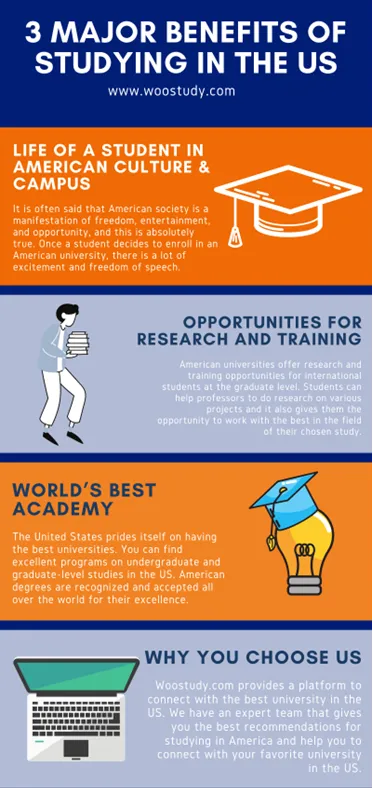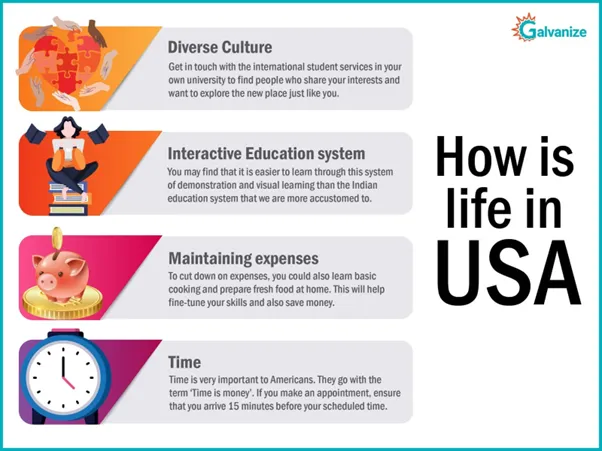December 07, 2023
Most common myths regarding studying in the US debunked!
by Arunachalam

These are several myths regarding studying in the United States. Over a million people study abroad at various universities in the US, making it the country with the largest foreign student population. These students make up more than 5% of all students in the nation, and their numbers are growing every year. As a result, high school students from other nations are becoming increasingly interested in attending colleges in the USA. But several myths have influenced international students to pick different locations for their study abroad programs. However, in this blog, we have made an effort to dispel such lies and inform you of the truth.
Table of Contents
- Myth 1: To pursue higher education in the US, you must be affluent
- Myth 2: The application process for student visas is difficult and drawn out.
- Myth 3: Public colleges are less expensive than private ones.
- Myth 4: To be admitted to a US university, you must have extraordinary marks.
- Myth 5: Paying back student debts is sometimes viewed as a challenging task
- Myth 6: It's tough to get a job in the US after graduating.
- Conclusion
The below image highlights the benefits of studying in the US.

Source: www.woostudy.com
Myth 1: To pursue higher education in the US, you must be affluent
Although attending college may seem pricey, you don't need to be wealthy to do it. There are still options for financial aid even if you're not a US citizen or are not enrolled. For international students, several American colleges provide need-based (depending on the student's financial situation) and need-blind (has no bearing on the student's financial situation) scholarships.
Myth 2: The application process for student visas is difficult and drawn out.
Although the application process for a student visa is straightforward, it does take some time to complete. US institutions welcomed more than a million foreign students in 2021–22. The institution will send you official paperwork called the I-20 as soon as you're accepted.
You'll need to book a visa interview at a US consulate after submitting your visa application. A police officer will verify your ability and willingness to attend school during the interview. To demonstrate to the immigration officer that you are a serious student, you should be able to describe how the study program fits with your career ambitions. After the interview, it should take the consulate roughly 5 to 6 days to stamp your visa.
Myth 3: Public colleges are less expensive than private ones.
When comparing prices, state colleges are less expensive than private universities. However, other factors influence which choice is the cheapest. For instance, attending a public university can cost three times as much if you're not from the same state as the college. Finding public universities with cheaper tuition for gifted out-of-state students or with lower tuition for out-of-state students, in general, is the only option to avoid this.
The below image illustrates the life of a student in the US.

Source: https://galvanizetestprep.com/
Myth 4: To be admitted to a US university, you must have extraordinary marks.
It may look amazing on your college application to have a flawless 4.0 Grade Point Average (GPA), but do you know what's even more crucial? A strong recommendation letter, an outstanding CV, and an outstanding essay. The admissions committees for colleges and universities are aware that grades do not always provide a clear picture of a student's ability. Through other parts of your application, they want to learn about your past, goals, successes, and difficulties to better understand your unique story.
Getting excellent scores is great, but it won't help you get into the school of your dreams. Throughout the application process, you must utilise each chance to demonstrate your suitability for the college. Even if you did poorly in a class, you may still explain why in your college essay and demonstrate your abilities in other areas by doing well on tests and earning a teacher's recommendation.
Myth 5: Paying back student debts is sometimes viewed as a challenging task
Although it may seem difficult, making a repayment plan while you are still in school can enable you to pay off your debts more quickly.
Start early by getting part-time work at the university and using the money to pay your payments in advance. Create a budget and stick to it or use a student budget calculator to keep track of your spending patterns.
After graduating, if you can, pay more towards your loan repayment than the required minimum. Over time, making larger payments might reduce your interest rate and overall loan cost.
Myth 6: It's tough to get a job in the US after graduating.
Finding a job can be difficult for anyone, but for overseas students, the process may bring unique difficulties. It's crucial to keep in mind nonetheless that finding a job is not impossible. Before you graduate, you should start getting ready for your career search. Additionally, you should strive to find internships because they can teach you skills and possibly lead to a regular career. When hunting for a job, you'll feel more confident the more informed you are about your visa alternatives, requirements, and fees.
Find out which businesses sponsor visas, the methods involved in requesting authorization, and how long the procedure takes. Young talent from all around the world is drawn to the US. International students have 60 days following graduation to participate in another program or an Optional Practical Training (OPT) program to find employment on an F-1 visa.
You can extend your F-1 visa for a year while working, interning, or doing research in your profession if you meet the requirements for OPT.
Conclusion
Prospective students can decide wisely whether to pursue higher education in the US by comprehending the facts and dispelling the falsehoods. To take full advantage of the chances at hand, it is crucial to undertake study, ask questions, and seek advice. Get in touch with our international education specialists at MWT Education Consultancy if you want more information about studying in the US. They will support you throughout the whole admissions process, including course and university selection and application completion.

Written by
Arunachalam
ENQUIRE NOW
April 03, 2024
Best Public Universities in Australia for Indian Students
Get a simple guide for Indian students on applying to Australian public universities.
April 03, 2024
Your Key to Study Abroad: Mastering Your Visa SOP Made Easy
Learn easy tips for writing your Visa Statement of Purpose (SOP) that get you closer to your dream education abroad.
April 03, 2024
Why Nurse Shortages Matter: Impact on Patients in Australia
Find out how not having enough nurses affects patient care in Australia's hospitals and clinics.
April 02, 2024
What Makes a Good Paediatric Nurse in Australia
Discover what makes Australian paediatric nurses exceptional: calmness, empathy, and dedication to children's well-being.
April 02, 2024
Beat Nurse Burnout: Tips for Nurses in Australia
Discover practical advice for nursing students and professionals in Australia to navigate the challenges of burnout.
April 02, 2024
The Tireless Work of Australian Nurses: A Closer Look
Explore the incredible dedication of Australian nurses, who work tirelessly day and night to keep us healthy and safe.
March 26, 2024
Making the Most of Nursing Internships
Learn about the benefits of nursing internships, like gaining confidence and building connections.
March 26, 2024
Discover Mental Health Nursing Careers in the UK
Find out why mental health nursing jobs in the UK offer stability and fulfilling work helping people in need.
March 26, 2024
The Crucial Role of Health Literacy in Nursing Practice
Uncover nurses' strategies to enhance patient care and communication skills through improved health literacy.
March 18, 2024
How Technology Helps Nurses: A Simple Guide
Discover how technology accelerates nurse learning by granting swift access to vital information for skill acquisition.
